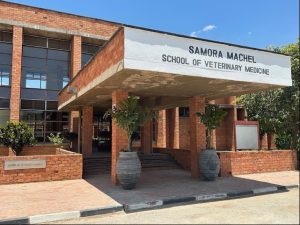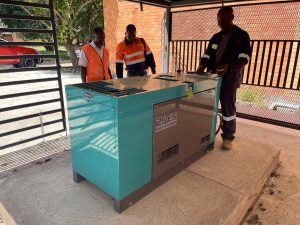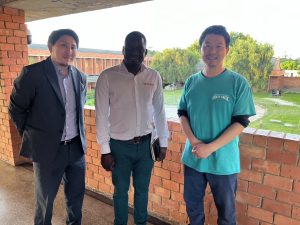The Challenge of the University of Zambia's School of Veterinary Medicine Protecting Research with Stable Power Supply from Denyo’s Diesel Generators
University of Zambia
Products introduced:
DCA-25ESK

Zambia University, a public university established by the Zambian government in 1965, is the most prestigious higher education institute in the country. It comprises 13 faculties and respective research institutes, conducting education and research across a wide range of fields including education, humanities, law, engineering, mining, agriculture, veterinary science, nursing, health sciences, and natural sciences. The university serves as a hub for nurturing talented students nationwide and supporting Zambia’s national development. In fact, the current president of the country, former president, and even the president from three generations ago are graduates of Zambia University, highlighting its significant impact on Zambian society.
Zambia University’s School of Veterinary Medicine was constructed in 1983 through Japan’s Grant Aid, which was non-repayable funding assistance from the Japanese government.
At that time, due to a shortage of veterinary expertise in Zambia, the Japanese government selected Hokkaido University as a partner and established a cooperative relationship.
Hokkaido University has fully supported Zambia University from the establishment to the operation of the School of Veterinary Medicine, dispatching staff for education, providing technical staff for equipment installation and maintenance.
It also provided support through various other means such as equipment provision and enhancement of educational programs. In 2007, the Hokkaido University Research Center for Zoonosis Control was established within Zambia University.
[Issues]
- Frequent power outages in Zambia raised concerns about maintaining the environment of research facilities. As a federal state, electricity costs were also high.
- The old backup system was aging, and attempts to repair it were unsuccessful.
- They couldn't find a suitable Japanese company to provide support with introducing a new generator.
[Solutions]
- A robust power backup system was to be established.
- A new Japanese generator would be introduced, creating a system that swiftly and automatically backs up power in case of an outage.
- It was discovered that Hitachi Construction Machinery Zambia, which has a wide business presence in Zambia, is a dealer of Denyo products. They would also handle after-sales service.
Power shortages were causing instability in research environments, making backup of new power generators crucial
At the center, the “Research and Investigation of Viral Zoonoses in Africa” project was launched in Zambia, supporting the establishment and improvement of virus diagnostic methods, research on viral zoonoses, and enhancing diagnostic capabilities. The project involves collecting samples such as bird droppings from migratory birds, bat blood, and ticks, and analyzing them together with Zambian researchers. So far, three new virus strains and nine strains of influenza virus have been successfully detected.
The same year in 2007, the School of Veterinary Medicine at Zambia University introduced emergency generators manufactured in Japan as a backup power system to continue research activities during power outages. Bernard M. Hang’ombe, Dean of the School of Veterinary Medicine at Zambia University shared the following statement:
“A large amount of Japanese-made equipment has been introduced at Zambia University due to its high reliability and durability. For example, refrigerators introduced in 1993 and vehicles used since the school’s opening have operated without problems for many years.”
Power shortages are a serious issue in Zambia, affecting universities as well. While the university uses a separate supply network from the general national power grid, facility-wide blackouts can occur due to frequent large-scale power outages. Since power outages can adversely affect expensive research equipment and animals under care, ensuring a stable power supply through backup systems is essential.
Especially in crucial research facilities like the Zoonosis Research Center, interruptions due to power outages are unacceptable. Therefore, it is necessary to introduce reliable emergency generators to guarantee the continuation of research activities. Masahiro Kajihara, Associate Professor at the International Joint Research Institute for Zoonosis, Hokkaido University, Zambia Base Deputy Director, explained:
“In Zambia, eight-hour scheduled power outages are conducted daily due to chronic power shortages. Electricity is extremely important for our activities. Stable power supply is indispensable for storing samples collected in the field (such as animal blood and tissues) at appropriate temperatures, and some reagents used in PCR tests must be stored at low temperatures. Additionally, unstable power supply in laboratories dealing with specific infections can pose safety concerns.”
Veterinarians actually have a wide range of responsibilities. They also check for infections. In Africa and elsewhere, veterinarians play a significant role in various scenes, such as checking the safety of regularly eaten meat. In Zambia, they play a crucial role, as meat and related sectors are tied to national strength.
Due to the aging of the backup system at the University of Zambia’s School of Veterinary Medicine, a decision was made to renew the generator. Initially, they attempted to repair the existing generator, but the service support system from over 15 years ago had been discontinued, making it impossible to carry out sufficient repairs, which caused significant difficulties. As a result, they decided to introduce a new generator. However, they struggled to find a company that could implement and provide after-sales support for the replacement generator manufacturer, delaying the implementation plan
Finding Out About Denyo Generators and Hitachi Construction Machinery Zambia : Supporting Research with Stable Power Supply
The previous generator used before the replacement was also made in Japan, as were many of the surrounding devices. For this reason, Kajihara’s team wanted to introduce another Japanese-made generator. However, they couldn’t find details on the past transaction and had to search for a new company to work with.
They reached out to several companies but found that some did not handle the appropriate products, while others involved concerns about after-sales service, making it difficult to find a suitable company. Kajihara initially decided that they might have no choice but to rely on a local Zambian company, but then realized that there was still one Japanese company they hadn’t contacted.
That company was Denyo. Upon contacting them, they found that the company had appointed Hitachi Construction Machinery Zambia as their local dealer, and after-sales service was fully covered.
Denyo quickly requested Hitachi Construction Machinery Zambia’s assistance, and together they thoroughly inspected the existing equipment, connections to surrounding devices, essential requirements for replacing the old equipment with new ones, and the installation site.
They also kindly proposed a cost estimate and schedule for local construction, which was gladly accepted by the equipment managers at Hokkaido University and the University of Zambia. As a result, they decided to introduce the diesel generator “DCA-25ESK” along with an automatic transfer switch.

The DCA-25ESK is equipped with an air-cooled, four-cycle diesel engine, with a rated output of 20 kVA. It has a fuel tank capacity of 55 liters and can run continuously for about 8.6 hours, making it a perfect fit for this replacement, especially considering Zambia’s unstable power supply and the need for a reliable solution at a reasonable price.
Thus, the backup system for the University of Zambia’s School of Veterinary Medicine was replaced, and the new system now automatically activates and starts supplying power in the shortest time possible when a power outage occurs. This has also eliminated the need for manual operation.
Kajihara commented, “We are very satisfied with the service from Denyo and Hitachi Construction Machinery Zambia. They responded very quickly, and we are deeply grateful for their effort in delivering the generator all the way to Zambia. A Denyo representative also came from Japan to supervise a trial run to ensure that the generator could supply power without any issues.”
This trial run was a suggestion from Denyo to allow its customer to personally verify that the product can reliably supply power, ensuring peace of mind for long-term use.
After the equipment arrived, Denyo continued to work closely with Hitachi Construction Machinery Zambia, regularly checking the progress and visiting the site to conduct the trial when the generator replacement was complete.
Kajihara noted that the generator is an “unsung hero,” and essential to the advancement of infectious disease research in Zambia. The installation of this generator will continue to play a critical role in supporting research activities at the University of Zambia’s School of Veterinary Medicine.

Contact us
for more information
Contact us
for more information



